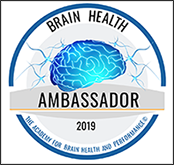Clear Thinking During Turbulent Times
Does the world seem upside down? It’s never been easier to become distracted and even depressed, than right now, during the COVID-19 pandemic and the volatile political and cultural climate of 2020. When stress is at an all-time high, what can you do to keep your reasoning ability sharp and clear–to stay on top of it all?
 Though eradicating the virus and changing the world condition is beyond your control, you and I are lucky to be living in these times. Why? For the first time in human history, you can leverage a better, deeper understanding of neuroscience and its application to your body, mind, and soul. Even in today’s crazy times, you have the advantage through neuroscience, of leveraging more control over yourself to remain calm and think clearly.
Though eradicating the virus and changing the world condition is beyond your control, you and I are lucky to be living in these times. Why? For the first time in human history, you can leverage a better, deeper understanding of neuroscience and its application to your body, mind, and soul. Even in today’s crazy times, you have the advantage through neuroscience, of leveraging more control over yourself to remain calm and think clearly.
Moving is Marvelous
Each day, our local communities, states, nation, and the world are engulfed in uncertainty, dramatic change, and more disturbing news. You may have a lot on your plate yet feel you can’t think straight. Take heart! You don’t have to be stuck in a rut of stress and confusion, feeling that you’re overwhelmed. This is where advances in neuroscience come into play. You can learn to navigate these unique times by practicing a simple, time-tested, and true (and free) formula: Moving. Keeping your body in motion is a marvelous antidote! Get up on your feet and move! Shake your booty!
Researchers, Michael Yassa, from the University of California, Irvine; and Hideaki Soya, from the University of Tsukuba, Japan [2018] conducted a study on the benefits of motion on brain function and performance. Participants spent just 10 minutes a day pedaling on a stationary bike. This low-intensity exercise showed surprisingly immediate improvements in memory and brain connections.
Bountiful Benefits of Moving
Moving your body brings blood and oxygen to your brain and removes toxins. When your heart is pounding, the region of the brain that retrieves memories and helps you learn—the hippocampus—gets bigger!
Anything, but no more social distancing!
And there’s more:
- Dopamine is secreted, which helps you motivate yourself, focus, and learn
- Norepinephrine is released to improve alertness, energy, and drive
- Endorphins are disbursed, triggering positive feelings
- Brain-derived neurotrophic factor (BDNF) is dispensed to protect and repair neurons
- Serotonin flows and your mood improves
About That Stress…
Circling back to where we started—if all of that isn’t enough, exercise is key for stress reduction. Just as exercise has been proven  to increase the size of the brain’s learning
to increase the size of the brain’s learning
and memory center (hippocampus), stress has the
opposite effect—it shrinks the hippocampus. Chronic
stress has been shown to have devasting, long-term effects on the hippocampus [Lupien et al. (2009)].
Fitness & wellness coach and popular podcaster, Brock Armstrong, puts it like this: “Exercising your butt will make you smarter!” Even ten minutes of exercise works wonders for eradicating stress and keeping you sharp when you need to be.
Don’t Let Stress Dampen Your Brilliance—Shine!
Your brain loves it when you move. Make your brain happy. Research shows that even a short twenty-minute walk or a ten-minute run improves well-being. Don’t just rely on research, try it for yourself. When your report is due but your brain is stalled, get busy working your glutes! If you can’t think clearly, leave your desk, and take a walk, go for a run, or climb the stairs. Get your heart pumping and oxygen flowing. See how well exercise and simple movement restores your cognitive abilities, improves your outlook, and re-energizes you–even in the toughest of times.

